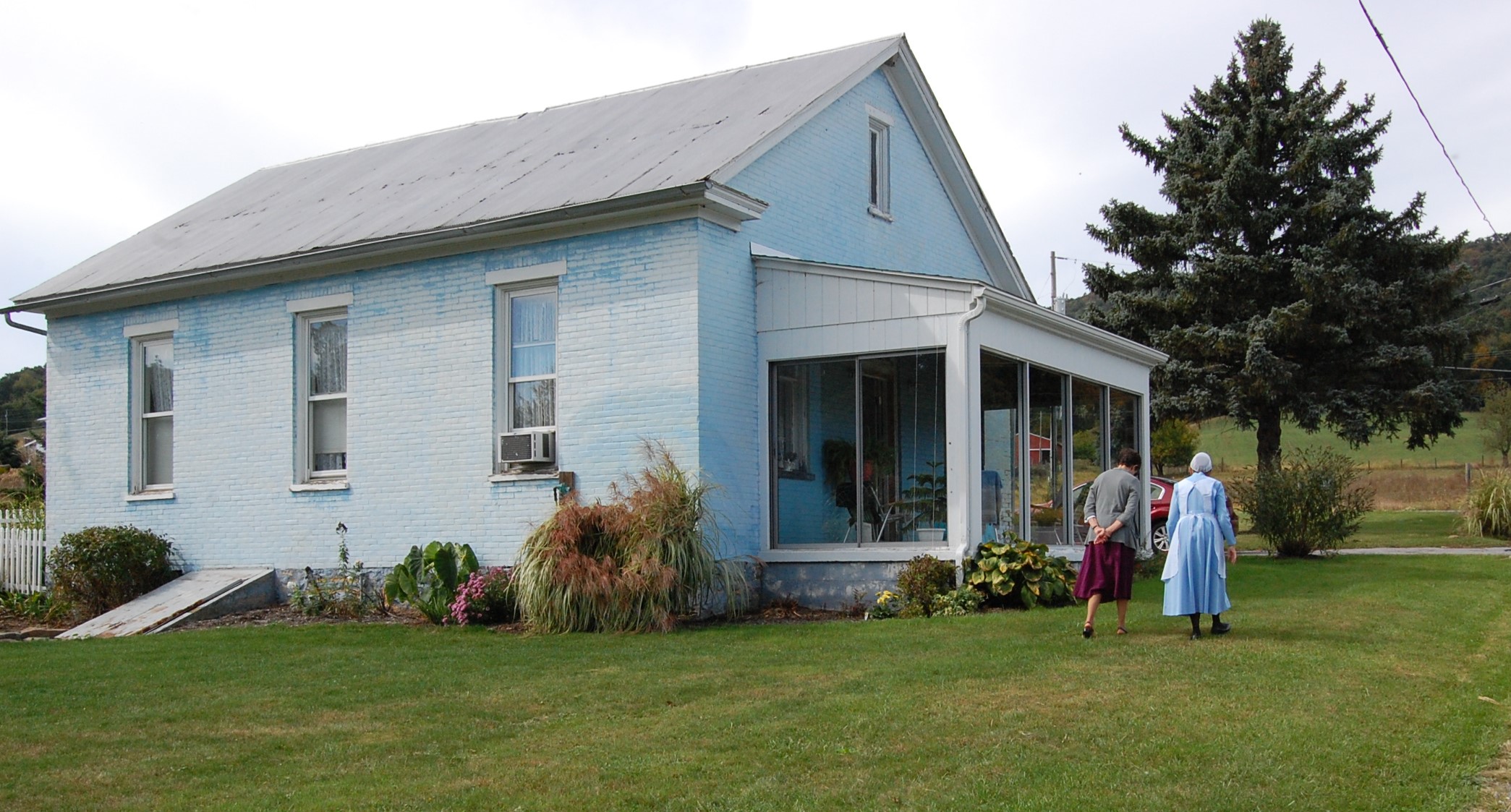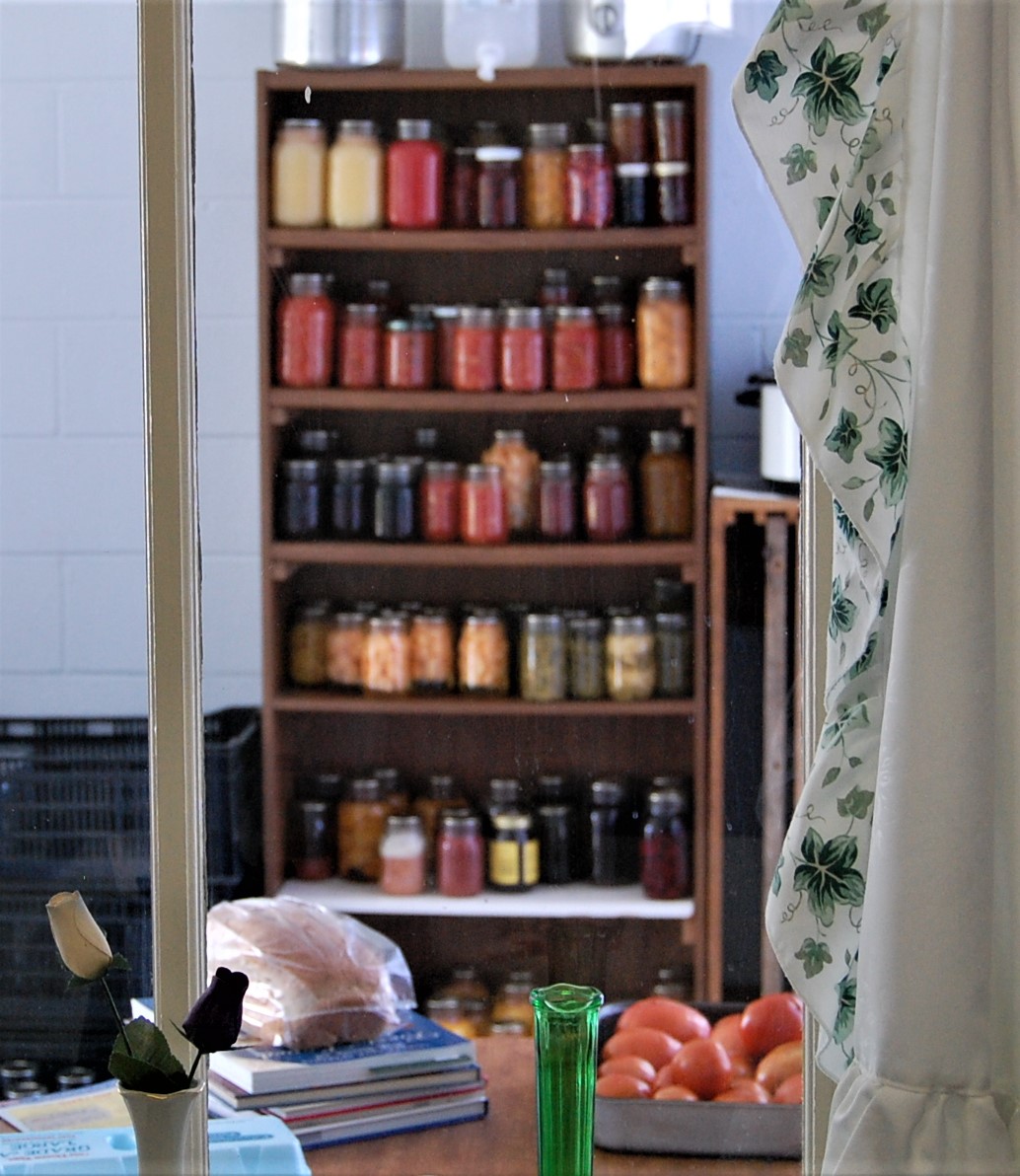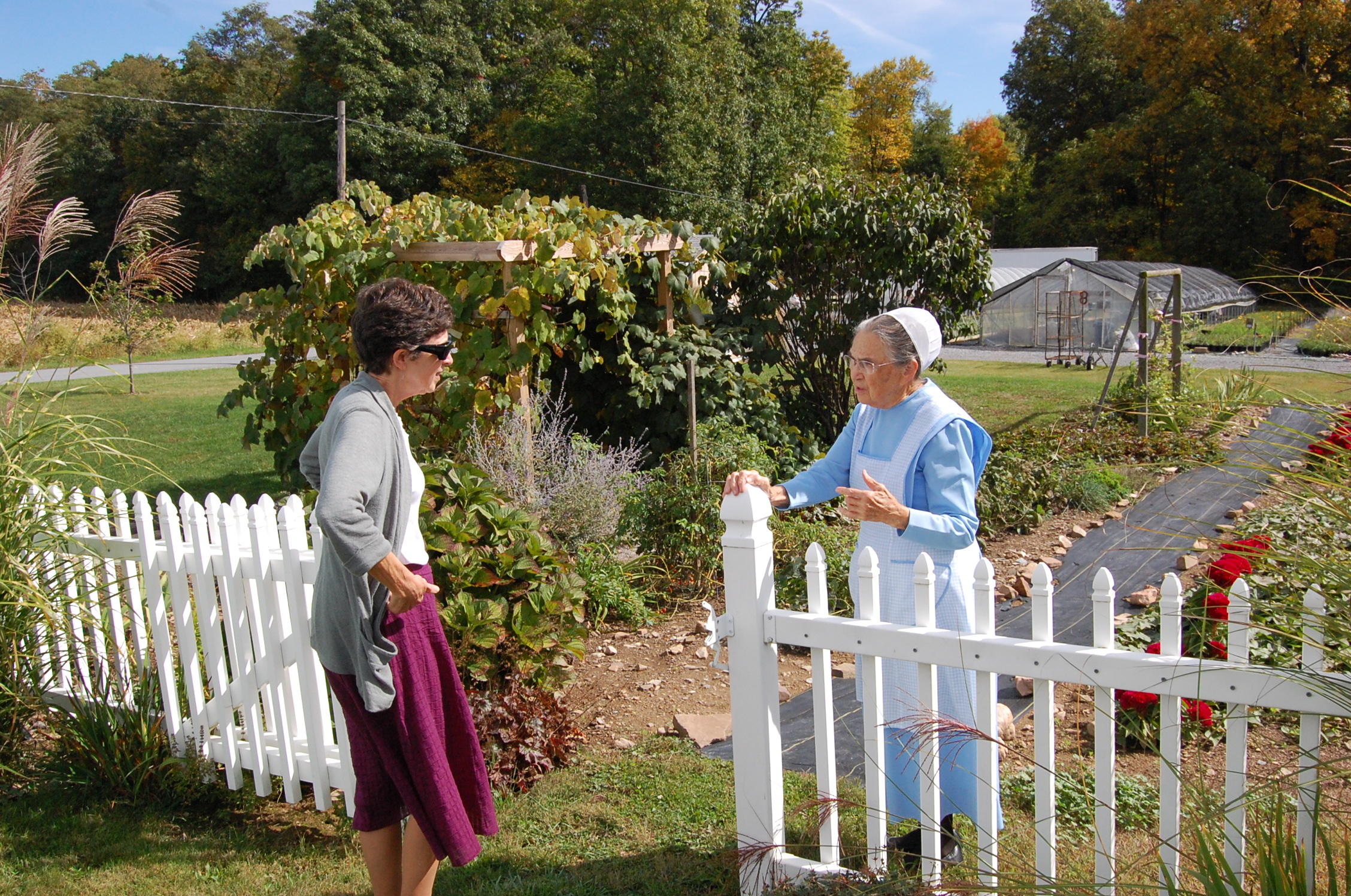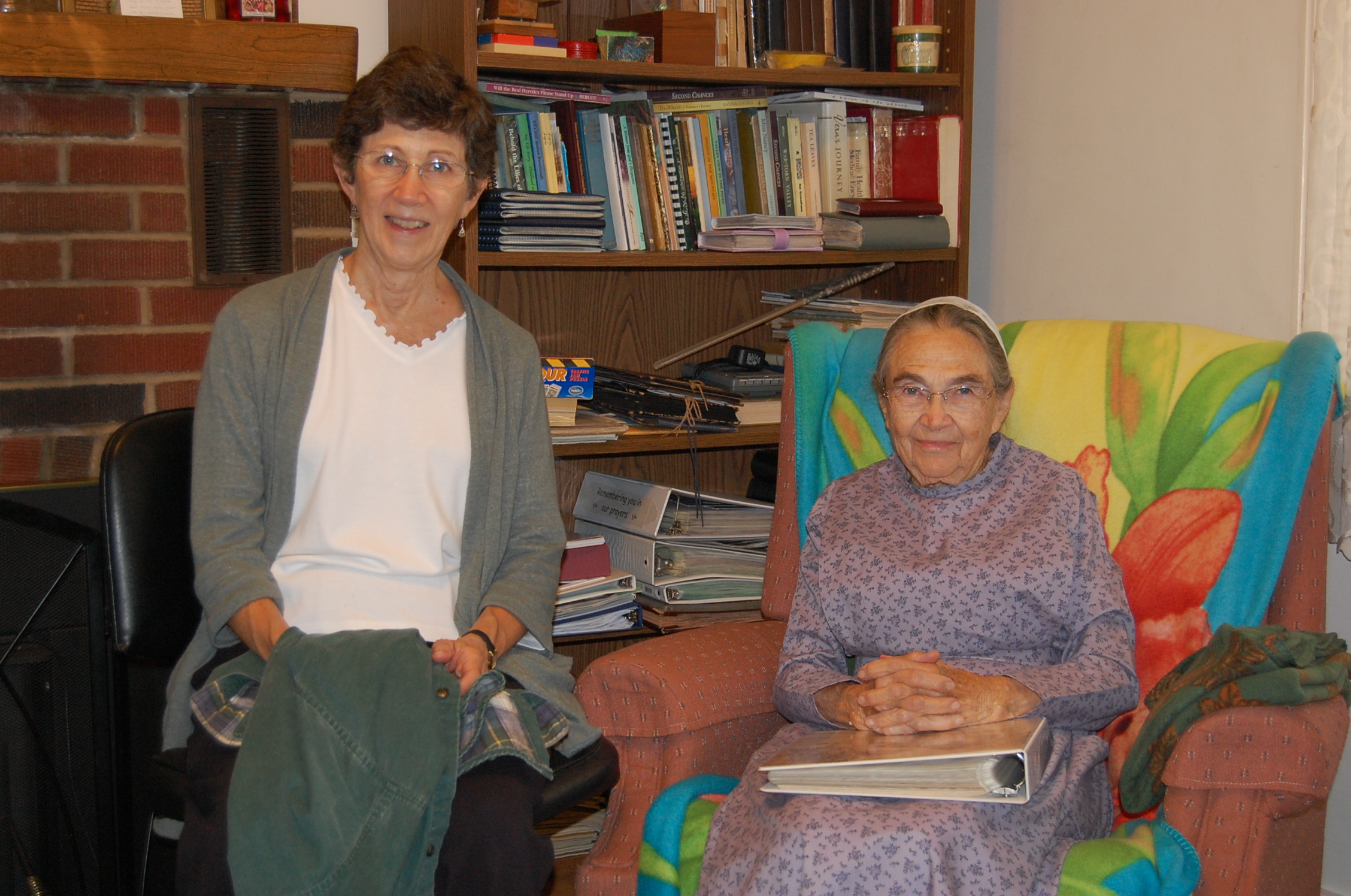A Visit with Aunt Goldie
I am fast losing those in the generation above me. My father and mother have been gone for years, followed by many of their siblings and cousins. While I have not lost any of my uncles or aunts to the pandemic, they are continuing to slip away, their passing made more poignant because I can’t travel to funerals and grieve in person with family members. In the past several weeks we have been following from a distance the decline of an uncle who died last week, and I have only begun to take in that loss. A few months earlier I lost an aunt—Goldie the sister next younger to my father. Because I couldn’t be with her in her last days to say goodbye in person, I have been recalling a visit Wayne and I made to her five years ago. Remembering that helps me honor her life.

The faded blue of Aunt Goldie’s remodeled school house was just right for her, gently worn, but not shabby, colorful without calling attention to itself. When my husband and I arrived, she came to the door, slightly stooped, her blue dress almost matching the house and her bib apron crisp and clean. She had been standing at the stove stirring gravy, and she returned to it as soon as she greeted me with a demure kiss. I would have liked an enthusiastic Aunt Velma-style hug but what I got was the Sunday morning “holy kiss.” Aunt Goldie had learned well how to hold in her feelings. It would be unseemly to show too much emotion, just as it was unseemly to show too much skin.
We brought in our things and I offered to help with dinner. Still stirring the gravy, she suggested that I pour water. I filled the two normal glasses for Wayne and me. At her place was a shot glass. “Oh, I don’t drink very much,” she said, when I inquired about it. “I don’t need much water.” I refrained from arguing with her, wondering momentarily if she might not have more big glasses, but then I noticed others matching ours in the china cupboard. I wondered where in the world she came upon a shot glass, and if she had any idea what it really was.
Aunt Goldie had not stinted on the meal. We had roast beef with potatoes and carrots, corn from her garden, salad with lettuce also from her garden, herbed whole wheat bread she had made, and homemade jelly. Because it was the middle of the day when I was not used to having a main meal, I took modest portions, but they looked gigantic beside her bird-sized ones. Her piece of meat matched the proportion of her drinking glass. I couldn’t help noticing though, that she took a normal size piece of chocolate cream pie with peanut butter crumbs on top for dessert. I would have told her it was sinfully delicious, but she wouldn’t have enjoyed the humor. Throughout the meal, my eyes kept wandering to a window into her garage which she used as storage space. Her carefully lined-up jars of canned things ought to be made into a poster, I said. She just laughed at the idea. There was nothing remarkable to her in the colorful display. It was ordinary, mundane.

After we “washed up” the dishes, Aunt Goldie was eager to take us out to see her garden. Next to the house was a row of gladiolas which she had just dug up for the winter. Those were a specialty of her mother, my Grandma Weaver. Standing in the garden was an all-metal hand cultivator that Aunt Goldie used, a sturdy implement that was a little hard for me to envision her pushing through the rocky soil, but she assured us that she did.

The stated purpose of our visit was for help in arranging old pictures, so I laid them out on the table, and Aunt Goldie helped identify people and place pictures in chronological order. We also looked at some of her photo albums.
It sounds like an easy afternoon, but suddenly I was very tired and felt the beginnings of a headache. I needed a nap, but why? What was tiring me? As I lay down and propped my feet up on an extra pillow, I thought of all my memories of being at Grandpa and Grandma Weaver’s house—the happiness, the voices calling, the laughter, the pump squeaking, the screen door banging, the games with cousins, the aroma of freshly-baked bread. It had come rushing back to me when we arrived, carried on the slender weight of Aunt Goldie’s voice, a voice she uses every day but one that connected me to my past. Part of me was lost in nostalgia and the tinges of sadness that brings. So many people gone. So much changed. Was that what my tiredness was about? Maybe part of it. There seemed to be more. I realized that her having lived with Uncle Mel all these years and having gone from one church to another, each one more conservative than the previous one had bred a restraint in her that was hard for me to encounter. At some barely conscious level, I was continually trying to break through her reserve to find the laughing, freer Aunt Goldie I used to know, or at least the one I imagined I used to know. Maybe that was tiring me. I dozed off, and woke feeling less tired.
We crossed the road to her daughter Rosalie’s house for supper. Rosalie has four daughters living at home ranging in age from mid-teens to early thirties. They were all there, smiling, friendly, rosy-cheeked, and, like their Grandma, demure. The two youngest, beautiful young ladies, were twins who I struggled to keep straight. As we ate our meal, conversation came a bit slowly. I wasn’t sure what topics were safe. How do I inquire into the lives of four young women who have not finished high school and have no career plans, who don’t see movies, read many books, or travel outside their tiny world? Most of the usual questions were off the table. I did manage one joke. At the end of supper Rosalie invited us, the guests, to the living room saying that “the girls” would do the dishes. I turned to Aunt Goldie next to me and said, “Well, I guess that’s us. We’re pretty good at doing dishes, aren’t we?” and she laughingly agreed. The granddaughters laughed, but they did the dishes.
The next morning as we were gathering our things to leave, Aunt Goldie wanted to be sure to show me her weeding bench, the kind one sees in gardening catalogs. She was clearly very pleased with it. The construction was simple—a metal frame with a low rubber kneeling ledge. She could take it into the garden and kneel right next to rows of beans or peas and pick without needing to get down on the ground. It could also be turned upside down to make a table on which to place a pan when she was shelling peas or snipping beans. I couldn’t get out of my head the image of a prie dieu, a prayer bench. Her versatile, utilitarian tool seemed the opposite of a cushioned, ornately carved wooden prie dieu, but the two somehow merged for me. Not that her bench was ornate. It was simple, but it served for both her practical work in the garden and the practical prayers for her family, friends, and church. In her world, work and prayer fit together seamlessly and were almost synonymous. The time she spent on her knees in the garden was as much a time of prayer as of work—weeding was the way she saved her small corner of the world.
As I look back on our visit, I begin to picture Aunt Goldie’s restraint as a blanket that covered her real self. It may have stayed smooth and proper some of the time, but under it the shapes of love became clearly visible, as when a child plays under a blanket that gradually falls down around her and shows her form. Aunt Goldie had been eager for Wayne and me to come to visit—come “before snow flies,” she said on the phone. Then there was that “Sunday dinner” of a meal she fixed for us on a Tuesday noon, and the photo albums she carefully chose for me to look at. When I told her about my 50th high school class reunion, she wrote it on her calendar so she would remember when it was, just as if I were a child of hers whose important events she wanted to note. Then came the leave-taking. She offered us bags of frozen green beans and lima beans which we had to decline because we weren’t going directly home. Next came chocolate cookies, and cherry tomatoes, and sesame sticks. She went out to her flower bed and cut coxcombs for me. She inquired whether we wanted a lunch. When it was time to say goodbye, I accepted her “holy kiss,” but then I wrapped my arms around her and she hugged me back. For a moment at least, the blanket lifted and she stood there, her real self.

My dear Aunt Goldie Miller, who died July 8, 2020 at the age of 93.
Reading this makes me feel like I just had a visit with Aunt Goldie. I also love the photos… most especially the one of the two of you in the garden.
Thank you for another thoughtful post.
Thanks, Saloma. You and she would have gotten along well together. She would have been interested in your rug-making for sure.
Kathie,
I really enjoyed “visiting” your Aunt Goldie. She must have been so special in your life, and that trip brought back such cherished memories for you. I would have liked to have known her. She passed away on my birthday.
I look forward to your next post.
Debbie
I love this written “photo” of Aunt Goldie and you, in which you’re brought together, in spite of years and experiences that separate, ostensibly to get people and dates clarified.